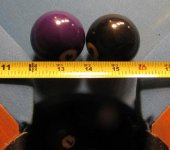I got a news flash for all you tight pocket aficionados....
It's not illegal to be accurate on a loose table......
..and you'll learn more about cue-ball control....
...and run-out patterns.
I think the best safety players and the best position players come from
pool tables, not snooker tables.
Snooker players are too busy trying to make a ball.....
...and anybody can play safe on a tight table.
It's not illegal to be accurate on a loose table......
..and you'll learn more about cue-ball control....
...and run-out patterns.
I think the best safety players and the best position players come from
pool tables, not snooker tables.
Snooker players are too busy trying to make a ball.....
...and anybody can play safe on a tight table.
